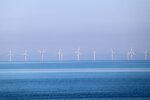03/19/2009
USA - Study finds wind power economically, environmentally advantageous when coupled with grid improvements
Wind-generated electricity from the upper Midwest will become cost-competitive with power generated from more conventional fuel sources like coal, while providing reductions in greenhouse gas emissions when connected to the nation's electricity grid via new extra-high voltage transmission lines, a new study by The Brattle Group has concluded.
The study, "Transmission Super Highway: Benefits of Extra High Voltage Transmission Overlays," provides evidence that renewable resources offer an important and economically-feasible means to respond to escalating energy demands in a carbon-regulated environment with domestic energy sources. The study was commissioned by ITC Holdings Corp.
In testimony before the U.S. Senate and Natural Resources Committee, Joseph L. Welch, chairman, president and CEO of ITC, discussed the study's findings and urged Congress to facilitate renewable energy by updating the policies that govern America's power grid. He also stressed the need for new transmission development to enable states to meet renewable portfolio standards (RPS).
"Right now, the outdated laws that govern our electricity grid are standing in the way of America's energy goals," said Welch. "If Congress is serious about making renewable resources available, reducing our dependence on foreign oil, meeting renewable portfolio standards, and addressing climate change and other environmental challenges, they need to start by modernizing the rules that govern the grid.
"Transmission, which should be the enabler, is today a roadblock to the development of the full potential of renewable resources such as wind, solar and geothermal resources," Welch stressed.
The Brattle study shows that wind power from the windiest parts of the country can economically displace fossil-fuel power sources after 2020 under likely climate policies. The current lack of extra high voltage transmission lines through these regions -- the upper Midwest states including North and South Dakota, Iowa and Minnesota -- is a significant barrier to harnessing this valuable resource as a viable energy solution in a carbon-regulated environment. The study concludes that extra-high voltage transmission projects -- like ITC's proposed Green Power Express -- are essential for accessing the nation's most important renewable energy resources.
The Green Power Express transmission project will traverse portions of North Dakota, South Dakota, Minnesota, Iowa, Wisconsin, Illinois and Indiana and will ultimately include approximately 3,000 miles of extra high-voltage (765 kilovolt) transmission. The entire project is currently estimated to cost approximately $10-12 billion. The project could result in the efficient movement of up to 12,000 megawatts (MW) of wind power from the upper Midwest states to load centers in the Midwest and ultimately to the East Coast.
In his testimony, Welch stressed that the environmental and cost savings will only be realized if projects like the Green Power Express can be developed and built in a timely manner. He urged Congress to establish mandatory industry participation in regional transmission planning authorities and for these organizations to aggressively pursue a new planning strategy that promotes electric grid interconnection across the country. Seven regional planning authorities -- collectively regional transmission operators or independent system operators (RTO/ISO) -- oversee transmission issues over wide areas in the continental U.S.
Welch called for a greater federal role in determining the need for new transmission projects that will support renewable resources but added that states should continue to maintain the primary lead in determining where new transmission lines will be sited within their borders. Welch additionally noted that it is essential to improve the cost allocation system to ensure that the entire region that benefits from a project shares the costs.
"Our country is trying to tackle 21st century energy challenges with an electric transmission grid largely built more than 30 years ago while operating under an outdated regulatory system," Welch told the committee. "To put it simply, we will not meet our energy security, efficiency and environmental goals if we don't change how we do business. We urgently need to reform how we plan, locate and pay for new transmission. This requires moving beyond the parochial interests and fractured regulatory structure that has led to decades of underinvestment in our electricity grid."
Welch pointed out that Congress and federal regulators have the ability to modernize the rules to allow private companies such as ITC and others to make these critical infrastructure investments. He emphasized that the congressional policy changes needed to facilitate this investment "don't require an infusion of taxpayer dollars, but will create new jobs and help address our looming energy and environmental crises."
For more information please contact Trevor Sievert at ts@windfair.net
The study, "Transmission Super Highway: Benefits of Extra High Voltage Transmission Overlays," provides evidence that renewable resources offer an important and economically-feasible means to respond to escalating energy demands in a carbon-regulated environment with domestic energy sources. The study was commissioned by ITC Holdings Corp.
In testimony before the U.S. Senate and Natural Resources Committee, Joseph L. Welch, chairman, president and CEO of ITC, discussed the study's findings and urged Congress to facilitate renewable energy by updating the policies that govern America's power grid. He also stressed the need for new transmission development to enable states to meet renewable portfolio standards (RPS).
"Right now, the outdated laws that govern our electricity grid are standing in the way of America's energy goals," said Welch. "If Congress is serious about making renewable resources available, reducing our dependence on foreign oil, meeting renewable portfolio standards, and addressing climate change and other environmental challenges, they need to start by modernizing the rules that govern the grid.
"Transmission, which should be the enabler, is today a roadblock to the development of the full potential of renewable resources such as wind, solar and geothermal resources," Welch stressed.
The Brattle study shows that wind power from the windiest parts of the country can economically displace fossil-fuel power sources after 2020 under likely climate policies. The current lack of extra high voltage transmission lines through these regions -- the upper Midwest states including North and South Dakota, Iowa and Minnesota -- is a significant barrier to harnessing this valuable resource as a viable energy solution in a carbon-regulated environment. The study concludes that extra-high voltage transmission projects -- like ITC's proposed Green Power Express -- are essential for accessing the nation's most important renewable energy resources.
The Green Power Express transmission project will traverse portions of North Dakota, South Dakota, Minnesota, Iowa, Wisconsin, Illinois and Indiana and will ultimately include approximately 3,000 miles of extra high-voltage (765 kilovolt) transmission. The entire project is currently estimated to cost approximately $10-12 billion. The project could result in the efficient movement of up to 12,000 megawatts (MW) of wind power from the upper Midwest states to load centers in the Midwest and ultimately to the East Coast.
In his testimony, Welch stressed that the environmental and cost savings will only be realized if projects like the Green Power Express can be developed and built in a timely manner. He urged Congress to establish mandatory industry participation in regional transmission planning authorities and for these organizations to aggressively pursue a new planning strategy that promotes electric grid interconnection across the country. Seven regional planning authorities -- collectively regional transmission operators or independent system operators (RTO/ISO) -- oversee transmission issues over wide areas in the continental U.S.
Welch called for a greater federal role in determining the need for new transmission projects that will support renewable resources but added that states should continue to maintain the primary lead in determining where new transmission lines will be sited within their borders. Welch additionally noted that it is essential to improve the cost allocation system to ensure that the entire region that benefits from a project shares the costs.
"Our country is trying to tackle 21st century energy challenges with an electric transmission grid largely built more than 30 years ago while operating under an outdated regulatory system," Welch told the committee. "To put it simply, we will not meet our energy security, efficiency and environmental goals if we don't change how we do business. We urgently need to reform how we plan, locate and pay for new transmission. This requires moving beyond the parochial interests and fractured regulatory structure that has led to decades of underinvestment in our electricity grid."
Welch pointed out that Congress and federal regulators have the ability to modernize the rules to allow private companies such as ITC and others to make these critical infrastructure investments. He emphasized that the congressional policy changes needed to facilitate this investment "don't require an infusion of taxpayer dollars, but will create new jobs and help address our looming energy and environmental crises."
For more information please contact Trevor Sievert at ts@windfair.net
- Source:
- Online editorial www.windfair.net
- Author:
- Posted by Trevor Sievert, Online Editorial Journalist
- Email:
- ts@windfair.net
- Link:
- www.windfair.net/...
- Keywords:
- wind energy, renewable energy, jobs, wind turbine, wind power, wind farm, rotorblade, onshore, offshore


























